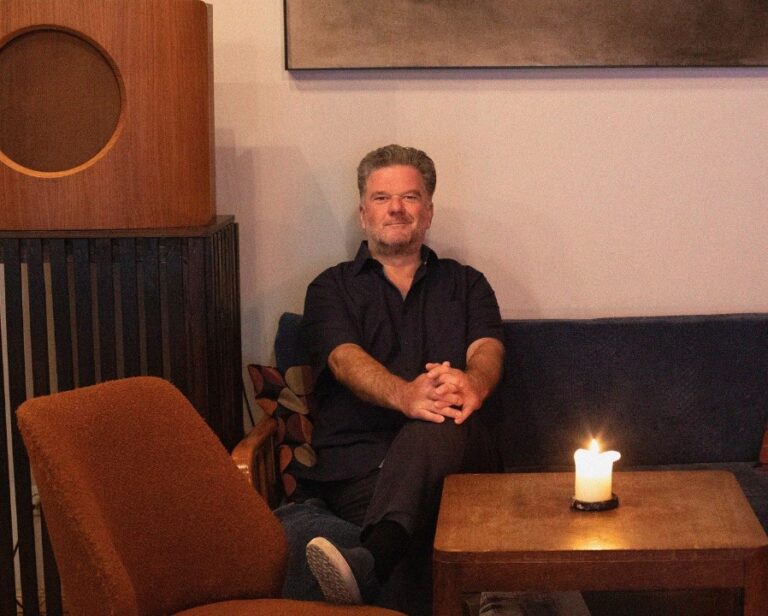Additional Information
When MUTEK was founded 25 years ago after incubating at Ex-Centris in the context of the Media Lounge, glitch was a dominant genre on the experimental electronic scene. The formal source of glitch was the deliberate deconstruction of dub music through sudden increases in tension. Derived from the malfunctioning of electronic lutherie, the glitch aesthetic was characterized by the creative integration of apparent sonic flaws. Germany’s Stefan Betke, aka POLE, was a recognized leader in this aesthetic. Over the past 25 years, POLE has been a frequent guest at various MUTEK events, and now he’s back in MTL to commemorate MUTEK’s quarter-century in the style he developed back then. That’s why PAN M 360 joined him on tour.
PAN M 360: You were a key MUTEK artist in the early years of the event, after which you went your own way on the international circuit. How has your art evolved in the years since?
Stefan Betke: There have been quite a few releases between the 1-2-3 trilogy (2000) and today. When you listen to all these recordings, I hope you can hear the natural development of my musical language. I’ve never abandoned bass, dub aesthetics, space planning, textural effects, all that. I’ve always added new vocabulary to the language I’ve created before.
PAN M 360: More generally, what remains of the glitch trend, what can we learn from it today?
Stefan Betke: We all agree that if we only dig into one detail of our creative life, it can get boring. We have to change.
PAN M 360: But at the same time, it was a very important movement. What was left of it?
Stefan Betke: Many artists were involved during this period, beyond music, visual artists, writers, intellectuals and so on. We remember these artists: Oval, Microstoria, Jan Jelinek, Burnt Friedman, Carsten Nicolai, myself, and so on. Others remained in the shadows, some evolving the Mille Plateaux and Scape labels, which were important at the time. It was an aesthetic imagined between 1995 and 1998, and which reached its apogee in 1999 and 2000. By the early 2000s, everything had been said, there was nothing left to add.
PAN M 360: Nevertheless, glitch discoveries are always present.
Stefan Bekte: Our influence is perceptible in much of the music of the last 25 years. Dubstep, for example, was influenced by these artists, myself included. Other genres still refer to the music we made back then. But we’re still here and we’re somewhere else, which means we’ve all evolved and most of us are still making interesting music.
PAN M 360: The original forms are still there in your music today, but the melodic and harmonic components stand out more. Jazz influences are more evident, for example.
Stefan Bekte: You have to remember that I started out with classical music and jazz. These elements were present in my glitch period, but were so deconstructed and reduced to their most minimal forms that it was difficult to recognize them at the time. And now, over the past 25 years, these influences have come into sharper focus, particularly on the recordings that preceded Tempus, such as Fading, Con-Struct and Wald.
PAN M 360: You also played in a band at this time. Were you already interested in music played in real time?
Stefan Bekte: I’ve always done that. Between 2000 and 2007, I toured with my band, a trio of bass, drums and electronic gear. This trio played at Mutek Mexico and Mutek Montreal.
PAN M 360: Your original musical education is emerging more clearly today, but you’re not abandoning what you’ve achieved electronically.
Stefan Bekte: I’d never do it. It’s always in me, it has to stay in me, but you have to transform the context. Sometimes it works well, sometimes it doesn’t. Composing music involves a certain amount of risk. In any case, it’s a great advantage to be able to do it: you can integrate old elements into a new context and open them up to a different audience.
PAN M 360: It’s the experience of a lifetime, a very long process of refinement. What are you presenting on stage on Sunday?
Stefan Bekte: I’ll be playing music from the Tempus album as well as other pieces. This solo set will be typical of my work. There will be a lot of sound overdubbing, and I’ll be using a variety of the latest technologies, both analog and digital.
PAN M 360: Of course, there will be a difference between the original recordings and what happens on stage.
Stefan Bekte: There’s always a difference between studio and live. Of course the music is based on the recording, the composition remains the same. But it can be a little more aggressive on stage, a little more dubby. In fact, the angle of attack depends on the mood in the room.
PAN M 360: And is there room for improvisation?
Stefan Bekte: Yes, of course! I improvise over loops recorded in real time. I can add sound effects such as reverb. I can make my pieces more ambient by removing the beat, or more dynamic by adding things. It all depends on the context in real time, so I make different decisions on the spot.
PAN M 360: At 57, do you still do a lot of touring?
Stefan Bekte: Yes, I’m still shooting, but less than before the pandemic. I also have to make room for the younger generations, who need to show their work. I’m coming to Montreal on Sunday, I’ve got a lot of other offers, but… Honestly, I don’t play as much as I used to, and I’m 25 years older.
PAN M 360: Perhaps it’s not as much fun to travel as it used to be…
Stefan Bekte: No, it’s the same pleasure! But there’s a change of generation, and that’s a good thing. There’s no room for everyone, so we have to share.
PAN M 360: Yes, it’s always that delicate balance between our role as seniors, our active life and sharing with the younger generations, it’s a difficult balance to strike.
Stefan Bekte: I couldn’t agree more. See you on Sunday!
POLE PERFORMS IN THE FINAL PROGRAM OF NOCTURNE SERIES, ON SUNDAY AT THE SAT
























